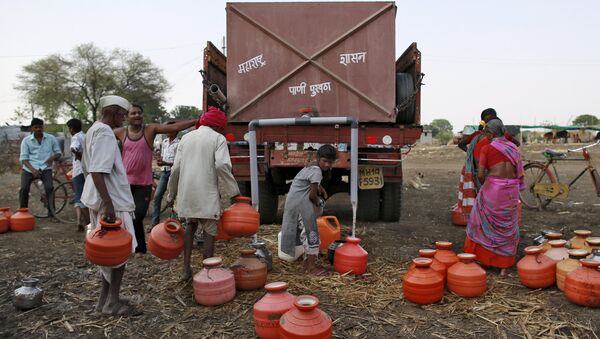New Delhi (Sputnik) — In India, when you talk to any environmentalist about climate change, the first phrase they use is ‘the next world war will be fought for water’. In the last two consecutive years India has faced severe drought. It has impacted the country's growth figures and dried out regions of the country, where acute water shortages are being reported.
A new World Bank report cautioned India's government, saying “countries that lack a sufficient amount of water could see their GDPs decline by as much as 6 percent by 2050.”
The World Bank’s report, “High and Dry: Climate Change, Water and the Economy” found that such declines occur due to the fact that water shortages lead to more conflicts, harm production and negatively affect the health and education of the country.
India has reason to worry, because the Indian economy is heavily dependent on agriculture, and agriculture is directly related to water. If we look into the current scenario, several areas in the state of Maharashtra are facing acute drinking water shortages; water for other purposes is even scarcer. Water trains are being dispatched by the government to relieve the country's most drought-affected areas.
If water scarcity persists until 2050, the short supply of water will harm the country's agricultural sector. There will be changes in what is being produced, where items are produced, and how efficiently water will be used in the process; consequently, food prices could spike. In India, rain-fed agriculture plays a major role in GDP and employs about 70 percent of the population.
These figures worry experts. Pankaj Kumar, the National Convenor of ‘ Rashtriya Jal Biradari’ told Sputnik that, “a reduced water supply will not only affect production but it will lead to increased conflicts in local areas, which will harm the local economy.”
Pankaj went on to say that “it is up to government how they tackle it, however we already informed the central and state government many times, citing various reports. In fact we have suggested some measures for water conservation also.”
However, there is a silver lining to the report. The World Bank also suggested that losses could vanish altogether if countries respond to water shortages efficiently.
Pankaj added that everything is not lost yet so he advises the government to take key measures which would have an immediate effect to tackle the water crisis. First, he advocates encouraging rain water harvesting; second, water conservation should be mandatory, and third, encroachments must be made free from the river bed so that ground water can be recharged. Pankaj warns that the future will be thirsty and uncertain, but with the right reforms, the government can help ensure that people and ecosystems are not left vulnerable to the more severe water-related shocks.




